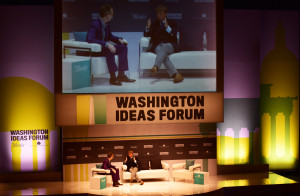BY NORA CHARLES, FEATURES EDITOR

As soon as I stepped through the glass doors of Harman Hall downtown, I felt like a spy sneaking into a VIP party. Jelly beans sorted by color sat temptingly in glass jars for the taking in front of every entrance to the main theater. Journalists milled around in the waiting area, chatting with one another or talking on their phones, holding muffins, yogurt parfaits, and lattes made on the spot and passed out for free, before filling the seats in the theater. Despite our fancy name tags, the other Beacon staff members and I stuck out as the youngest people there, apart from about 15 disoriented-looking students from School Without Walls.
Fifteen hundred journalists from all different media sources came to attend this two-day event of interviews with newsmakers and a wide variety of experts, which was born six years ago. Hosted by The Atlantic and the Aspen Institute, it is a miniature version of the Aspen Ideas Festival, a week long event that has taken place in Aspen, Colorado since 2005.
At 9 a.m. James Bennett, president and editor in chief of The Atlantic, opened the forum to a day of star speakers. Politicians and government officials including Deputy National Security Advisor Ben Rhodes, former Secretary of State Colin Powell, Secretary of Homeland Security Jeh Johnson, former Massachusetts Governor Mitt Romney, and Senator John McCain of Arizona, took turns being interviewed by journalists on the white couch under the spotlight. A screen reaching from the top of their heads to the ceiling projected their every move in larger form.
Despite the mesmerizing display, a surprising number of screens lit up the dark shadows of the theater’s seating sections. Many audience members were on their phones and iPads, checking the Washington Ideas Forum app and tweeting with the hashtag #IdeasForum.
The atmosphere changed when Theo Padnos started to speak. Padnos is a journalist who was kidnapped in 2012 by the Nusra Front, the Syrian branch of Al Qaeda. The screens went dark. People genuinely listened. Padnos looked slightly under attack as he sat against perfectly fluffed pillows in casual clothing with long curly hair and a hesitant nature. After the line up of clean cut politicians in suits giving answers polished from repetition, his quiet demeanor and honest openness temporarily stunned the audience.
His kidnappers had their children torture him every day, as a tool to desensitize them from violence. Padnos understood that torturing American hostages was a spiritual experience for his captors, as they believe that Americans are all Christians, and Christians are enemies of God. “It is all in the Quran,” he said. “Who are we to tell them they are misinterpreting their religion?”
Sitting next to his mom on the stage, Padnos still looked shaken. He was the only one of five American captives discussed in the session who got out alive. Yet he still stays in contact with his captors. “My relationship with them is basically good,” he said.
When his time was up, music came on as it did after every speaker, and he walked off. Opal Tometi, co-founder of #BlackLivesMatter, took his place. When asked about Black Lives Matter demonstrators who interrupted presidential candidates Bernie Sanders and Martin O’Malley during their speeches, and obstructed a marathon, she explained the urgency of the injustices Blacks face.
“The white moderate is our enemy. There is a crisis here,” she said. Her interviewer, Scott Stossel from The Atlantic, then asked her about Fox News calling the movement a hate group. Her calm and patient smile was a powerful counterargument. “We come from a place of love,” she said.
PHOTO BY CARL STEWART